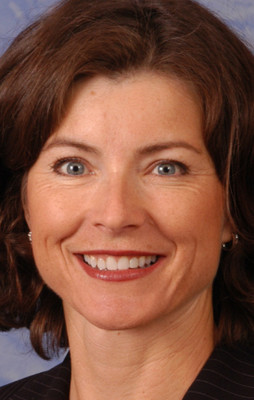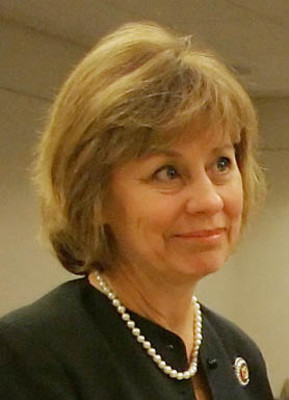Legal hurdles high for voter petitions
CARSON CITY -- Assemblywoman Heidi Gansert proclaimed she stood for the public's right to change law through petitions when she introduced a bill to clear up confusion caused by two petitions voters rejected in the November 2004 election.
Gansert, R-Reno, sponsored the bill that now limits petitions to a single subject, requires a 200-word summary of their intent and sets up a procedure for opponents to challenge them in court before signatures are collected.
Her legislation was attached to a larger bill dealing with petitions sponsored by state Sen. Randolph Townsend, R-Reno.
She asserts their motive was to ensure citizens could understand the typically long and complex petitions they are asked to sign as they leave supermarkets.
And she wanted to block petition circulators from promising one thing when the real purpose of their petitions is something far different.
"I don't dislike the petition process," said Gansert, now the Assembly minority leader, last week. "But let's be clear what a petition is all about. Don't say they are going to do one thing when what they do is something else."
But since her bill became law, three petitions to increase the gaming tax rate have been tossed out by judges after the Nevada Resort Association complained they violated the single-subject rule.
Two others to limit property taxes were jettisoned by sponsor Sharron Angle before scheduled court dates because of AFL-CIO objections to their summaries.
Only two petitions, one to legalize marijuana and another to restrict government's use of eminent domain proceedings to acquire land, have qualified for placement on election ballots since Gansert's bill became law in 2005.
Today petition circulators complain that legislators have blocked any chance average citizens have of changing laws or the state constitution through the initiative petition process.
"They have done everything they can to keep petitions off the ballot," said Nevada lawyer Kermitt Waters, whose two petitions to triple the state's 6.75 percent gaming tax were tossed Feb. 18 by District Judge Bill Maddox of Carson City. "When initiatives go through, it shows they aren't doing their jobs."
Janine Hansen, a longtime lobbyist for Nevada Eagle Forum, is even more blunt in her criticism.
"The Legislature did this purposely," she said. "The whole purpose of a petition is to provide the people with an alternative if the Legislature doesn't act in their best interests."
She noted conservative activists collected more than 100,000 signatures in 2000 and voters then overwhelmingly approved the Protection of Marriage constitutional amendment that outlaws the legal recognition of gay marriages. They acted because the Legislature would not take up the matter.
Then in 2004, public health activists collected signatures for a petition to outlaw smoking in most public places.
They moved to the petition process after the Legislature refused to take steps they considered necessary to protect citizens from second-hand smoke. Voters approved their petition in 2006, and now most public places are smoke-free.
Waters contends people like him resorted to the petition process to increase the gaming tax because the Legislature is beholden to the gaming industry and won't tax it to fix roads and pay for other needed public improvements.
A former member of the Assembly, Angle tried three times to persuade the Legislature to adopt her plan to limit property taxes, which is patterned after California's Proposition 13. Only when legislators would not act did she begin trying to bring the change through the petition process.
"We have been in litigation over our petitions for the last six months," she said. "It is nearly impossible to qualify a petition now because of the laws they have passed."
Through circulating petitions, Nevada citizens since 1912 have had the opportunity to bypass the Legislature to change laws and amend the state constitution.
It is a form of direct democracy that grew out of the Populist movement of the early 1900s.
Twenty-four states have similar laws that allow citizens to circulate petitions to change law, amend the constitution or force public referendums to gauge citizen views on issues.
While the right of citizens to circulate petitions is embedded in the Nevada Constitution, legislators still can pass laws that petition circulators must follow.
The Legislature sets the target of signatures that circulators must collect for petitions to qualify for placement on the election ballot. This year they need at least 58,828 valid signatures, or 10 percent of the total vote in the last general election.
Legislators also specify by law the time period circulators have to collect signatures. They face a May 20 deadline this year to submit petitions to amend the state constitution.
It is not just Gansert's law that frustrates petition circulators.
Last year the Legislature approved a complicated law sponsored by state Sen. Dean Rhoads, R-Tuscarora, that forces them to collect signatures in all 17 counties of the state.
They may collect twice as many signatures statewide as needed, but if they don't collect 28 in tiny Esmeralda County, then their petitions won't go on the election ballot.
"If you don't go there, you lose," Hansen said. "I have gone from Dyer to Silver Peak. I walked the streets of Goldfield. It takes an extraordinary effort to get a handful of signatures."
Qualifying petitions today has become such an expensive, time-consuming process with an inevitable legal battle that Hansen doubts anyone with less than a $1 million war chest can be successful.
But Gansert and Townsend say they had pure motives. They didn't want to prevent petitions from being placed before voters; they wanted to make sure citizens understood what they were being asked to sign.
Gansert noted that during the 2004 election period, a group affiliated with the Nevada Trial Lawyers Association circulated two misleading petitions.
In one, Nevadans were promised a 20 percent rollback in auto insurance rates, although the state legally could not order such cuts.
Embedded in that petition was its real purpose: to repeal a law that limited how much patients could recover in medical malpractice cases.
The other petition promised an end to the filing of frivolous lawsuits but contained sections to prevent caps from being placed on what lawyers could recover through filing frivolous lawsuits.
"That is what started my bill," Gansert said. "I wanted to make petitions understandable."
With a 200-word description, she figured, more citizens would take the time to read and understand what they were being asked to sign.
By limiting petitions to a single subject, Gansert sought to eliminate situations where someone would promise something extremely popular, such as auto insurance rate cuts, when the actual purpose was something far different.
Waters' two petitions to triple the gaming tax to a 20.2 percent rate were victims of the single-subject rule.
Besides tripling gaming taxes, Waters wanted to dictate how the extra revenue would be spent: for highway construction, developing solar and geothermal energy, raising teacher salaries, developing water sources for Nevada and paying the property taxes on each owner-occupied home.
He intends to appeal Maddox' decision to toss out his petitions to the Nevada Supreme Court, or force the issue into federal court.
Waters considers it absurd that he cannot circulate petitions that deal with several subjects. He noted the First Amendment of the U.S. Constitution deals with multiple subjects: freedom of speech, the press and religion, along with the right of people to assemble and petition government to settle grievances.
"If you cannot petition to raise taxes and also earmark where it is spent, you have effectively destroyed the initiative process," Waters said.
He is petitioning for citizens to increase the gaming tax because the Legislature won't do it and he doesn't trust the Legislature. "I don't want the Legislature to get the money, or it might return it to the casinos," Waters said.
Townsend said that if Waters wants to earmark how gaming tax revenue should be spent, then he should circulate a second petition.
"He is not prevented from circulating two separate initiatives about the same subject," Townsend said. "He could split them: one to increase taxes and the other on how the money would be spent."
As a private citizen in 1980, Townsend circulated the petitions that led to the creation of the consumer advocate's office.
"I know how difficult it is to draft petitions and how costly it is to circulate them," he said. "I have been there."
He speculated that people such as Waters and Angle have found it more difficult to put their issues on election ballots because citizens do not want the changes they advocate. He and Gansert also noted the gaming industry already contributes tax revenue that funds one-third of the costs of state government and public education.
Townsend noted there are 63 legislators of all political persuasions and some advocate higher gaming taxes. But many legislators and Nevada voters probably consider tripling the gaming tax too radical of a move, he said.
In response to public complaints about high property tax increases, Townsend said, the Legislature passed a law in 2005 that limits property tax increases to 3 percent a year on owner-occupied homes and 8 percent on other property.
"I think it is fair to say the Legislature's responded quite dramatically to public concerns," he said.
Contact reporter Ed Vogel at evogel @reviewjournal.com or (775) 687-3901.


















